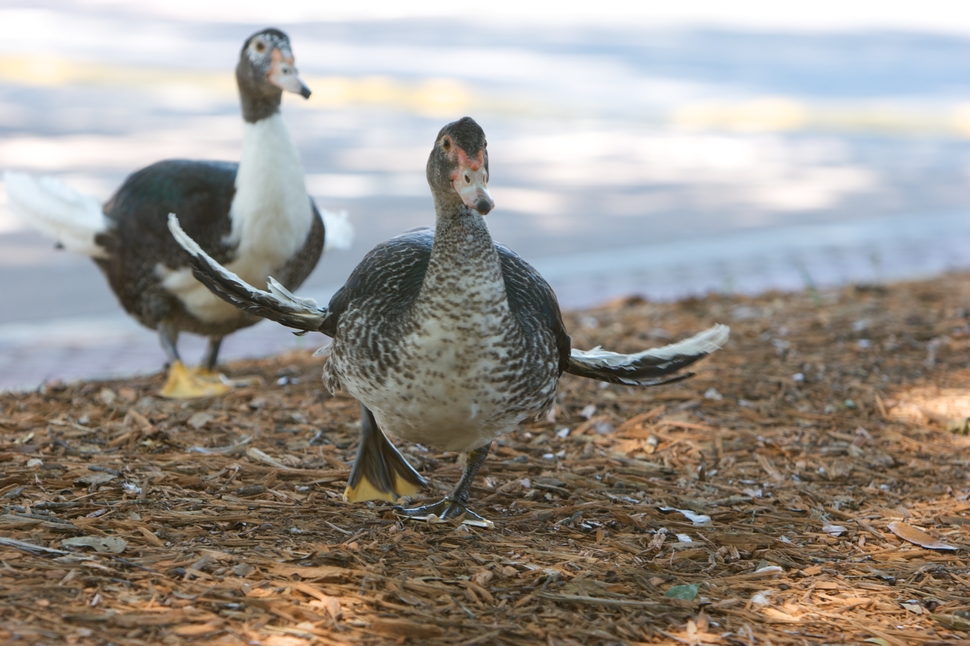When I was small, I used to feed ducks. At my grandparents’ house, we used to keep the bread that was left, put it inside a bag and go to the park to give it to the ducks. A few days ago, a friend of mine sent me the article inspiring this column titled: ‘Why you should never feed bread to ducks’ [1].
In sum, this article describes two harmful consequences of feeding ducks with bread. Firstly, it is harmful for the ducks, since this high-calorie diet can induce a disease called ‘angel wing’ which makes the wings point out laterally as in the image. This disease can produce inability to fly and eventual death. Quite a shock. Secondly, the bread inside the water is harmful for the environment because it can cause poisonous algae blooms. When I was small, I bet I had never heard the word ‘sustainability’. Now that I have it looks like feeding ducks was not a very sustainable way of managing organic waste… This is only an anecdote. But it triggers two reflections on me: about knowledge and about accountability.
About knowledge. Let’s take the assumption that many small actions can contribute or lead to a big goal -such as sustainability- and that the implementation of ideas is piece of cake when having a plan. Let’s also assume that the main driving force of these small actions is not economic profit but inner willingness, a willingness motivated by social and environmental awareness. These are big assumptions…but we can always allow big assumptions in thought-experiments. So let’s assume the following linear chain: awareness motivates willingness which drives small actions that contribute to sustainability. When I was small, I had never heard of the word ‘sustainability’, I had no awareness. Now I am a bit more aware, especially during the weeks of this course. But until a few days ago I had no idea that if I fed a duck in the canals of Delft I could actually damage the eco-system… So it looks like willingness and awareness are not sufficient without proper information.
I will bring another example. When I moved to the Netherlands, I decided to do the easiest small action to contribute to sustainability: recycling. I created three separate containers at home: one for paper, one for ‘packages’ and one for ‘the rest’. I had willingness, awareness but not the proper knowledge. Back in Spain we have yellow containers for all types of packages including bricks of milk products and metallic beer cans, so I thought that those containers saying ‘verpakking’ were meant for the same. A few months later I discovered that these are only for plastic packages [2]. This is a clear example of ‘harming when doing’ due to not having the proper knowledge.
This applies to any situation in which we take action without knowing the unintended consequences or impacts of it. The problem is that knowledge is not always accesible and that there will always be uncertainties surrounding causality relationships (e.g. climate-change metrics) since knowledge is also based on assumptions until real action or experimentation is taken. In simpler words, the linear chain described should change into a closed-loop system which begins and ends in knowledge: Knowledge triggers awareness (and expectations), which motivates willingness that drives action and this action generates new knowledge.
About accountability, the reflection is very short: as in every problem of many hands, we all –not only policymakers- share responsibility. As designers and later as consumers and users, we are accountable for getting the information that concerns us to make choices. As I am, for not knowing where to throw my milk packages!
References:
[1] IFL Science! . Why You Should Never Feed Bread To Ducks. [Online] November 16, 2015. http://www.iflscience.com/plants-and-animals/stop-feeding-bread-ducks-people.
[2] Delft creating history: recycle and minimize. A list of what is allowed and isn't allowed in the plastic containers. [Online] February 10, 2014. http://www.denhaag.nl/en/residents/to/Plastic-packaging.htm.
